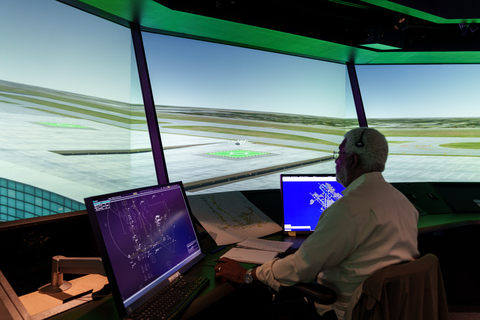Joby Aviation, Inc. (NYSE:JOBY), a company developing electric vertical take-off and landing (eVTOL) aircraft for commercial passenger service, today announced it has successfully completed a series of air traffic simulations with NASA’s Ames Research Center that evaluated how air taxi operations can be integrated into today’s airspace, including at busy airports, using existing air traffic control (ATC) tools and procedures.
This press release features multimedia. View the full release here: https://www.businesswire.com/news/home/20231220485778/en/

At NASA’s Future Flight Central virtual tower facility, Joby and NASA completed a series of airspace simulations with a team of participating air traffic controllers evaluating how air taxi operations can be integrated into today’s airspace. Joby Aviation Image (Photo: Business Wire)
The simulations, jointly developed by Joby and NASA airspace engineers following a multi-year airspace study, tested scenarios with dozens of eVTOL aircraft per hour flying into and out of the complex, busy airspace in the Dallas-Fort Worth (DFW) region using today’s airspace system.
The activity took place at NASA’s Future Flight Central, a high-fidelity virtual tower facility offering a 360-degree view of a real-time simulation of an airport, where a team of NASA and Joby engineers, as well as pilots and air traffic controllers, simulated traffic patterns at Dallas Love Field (DAL) and DFW airports, representative of complex and busy airspace.
During the simulation, participating teams of controllers virtually tested the ability to integrate up to 120 eVTOL operations – arrivals or departures – per hour from DFW’s Central Terminal Area, alongside the airport’s existing traffic. Up to 45 simulated eVTOL aircraft were simultaneously aloft in DFW’s Class B airspace during the activity.
“Working alongside our NASA colleagues, we have now demonstrated in a real-world simulation how air taxi operations can take place in today’s airspace system, alongside active airport traffic, using tools and procedures currently available to air traffic controllers,” said Tom Prevot, Air Taxi Product Lead at Joby. “These successful simulations were made possible by years of careful planning and collaboration between two organizations committed to redefining what is possible, and we’re proud to be paving the way towards the scaled commercialization of air taxis in the National Airspace System.”
Following scenarios developed by NASA and Joby airspace engineers, participating controllers employed some of the highly-structured routes and procedures used today in busy low-altitude airspace regions, including Letters of Agreement and dedicated controller positions to scale air taxi operations without impacting existing traffic.
NASA and Joby engineers hosted representatives from the FAA and the National Air Traffic Controllers Association (NATCA) to observe the simulation. More details on the simulation are available on NASA’s website and NASA will publish a complete analysis of the simulation results next year, sharing data with the industry and the FAA.
About Joby
Joby Aviation, Inc. (NYSE:JOBY) is a California-based transportation company developing an all-electric, vertical take-off and landing air taxi which it intends to operate as part of a fast, quiet, and convenient service in cities around the world. To learn more, visit www.jobyaviation.com.
Forward Looking Statements
This press release contains “forward-looking statements” within the meaning of the “safe harbor” provisions of the Private Securities Litigation Reform Act of 1995, including but not limited to, statements regarding the development and performance of our aircraft; our planned operations and the ability to integrate into existing airspace rules and procedures; our business plan, objectives, goals and market opportunity; and our current expectations relating to our business, financial condition, results of operations, prospects, capital needs and growth of our operations. You can identify forward-looking statements by the fact that they do not relate strictly to historical or current facts. These statements may include words such as “anticipate”, “estimate”, “expect”, “project”, “plan”, “intend”, “believe”, “may”, “will”, “should”, “can have”, “likely” and other words and terms of similar meaning in connection with any discussion of the timing or nature of future operating or financial performance or other events. All forward looking statements are subject to risks and uncertainties that may cause actual results to differ materially, including: our ability to launch our aerial ridesharing service and the growth of the urban air mobility market generally; our ability to produce aircraft that meet our performance expectations in the volumes and on the timelines that we project, and our ability to launch our service; the competitive environment in which we operate; our future capital needs; our ability to adequately protect and enforce our intellectual property rights; our ability to effectively respond to evolving regulations and standards relating to our aircraft; our reliance on third-party suppliers and service partners; uncertainties related to our estimates of the size of the market for our service and future revenue opportunities; and other important factors discussed in the section titled “Risk Factors” in our Annual Report on Form 10-K, filed with the Securities and Exchange Commission (the “SEC”) on March 1, 2023, and in future filings and other reports we file with or furnish to the SEC. Any such forward-looking statements represent management’s estimates and beliefs as of the date of this presentation. While we may elect to update such forward-looking statements at some point in the future, we disclaim any obligation to do so, even if subsequent events cause our views to change.
View source version on businesswire.com: https://www.businesswire.com/news/home/20231220485778/en/